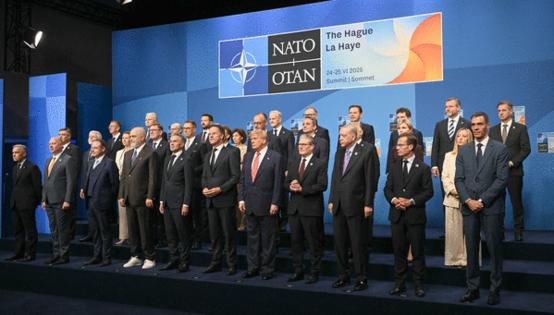Lionel Laurent: 'Daddy' Trump can't be trusted to love NATO
Published in Op Eds
President Donald Trump used to quip that he could shoot someone on Fifth Avenue and not lose support. The same might be said of the royal palace in The Hague, where the U.S. president arrived to a hero’s welcome despite having relentlessly berated, humiliated and questioned the utility of the North Atlantic Treaty Organization and European allies.
Even as Trump was his initially cagey self on whether NATO commitments still applied, alliance boss Mark Rutte poured on the charm for the man he called “daddy.” America’s attack on Iranian nuclear sites, despite its clear repudiation of European diplomatic efforts over the past decade, was praised as “truly extraordinary”; a move to more than double defense spending targets, another of Trump’s obsessions, was described as a “big success.”
Even Germany’s Friedrich Merz has described Israel’s bombing of Iran as the necessary “dirty work” of clipping Tehran’s nuclear wings.
This is apparently called politics — what Europeans feel they must do to preserve an alliance where the U.S. accounts for 70% of capabilities. The America First rhetoric of Vice President JD Vance in February has been politely forgotten in the face of what seems like a flip away from the MAGA world’s splendid isolation.
After all, Trump has let bunker busters fly; he has publicly laid claim to making “the world” safer; and he has displayed the kind of credible deterrence Europeans crave as Russia continues to bomb Ukraine. “Chapeau,” as the French say. Perhaps the global policeman can be persuaded to postpone his retirement with a barrel load of defense spending.
Yet this risks being a misreading of the memo from the Mideast. Foreign-policy expert Steven A. Cook has suggested Trump’s Iran intervention was a victory of opportunism over ideology — “Trump likes winners, and, well, the Israelis were kicking ass.” It was also a victory of unilateralism over alliances, with Europeans left in the dark and sidelined by the world’s most powerful individual, as French diplomat Sylvie Bermann put it. And in terms of priority, it also put Iran before Russia. Bringing an aspiring regional hegemon to heel isn’t a template everywhere, as seen in Trump’s subsequent “very nice” conversation with Vladimir Putin.
It’s of course tough to pin down where exactly we are between the Pax Americana that for decades upheld a global U.S.-led order and the MAGA alternative that would opt for restraint and retrenchment, particularly in Europe. Trump is neither consistent nor cautious; it may be that he fails to achieve the de-escalation he says he wants.
But on the face of it, there are still plenty of elements here in tune with a move away from the old model of global hegemony and towards what’s been called “offshore balancing” — intervening only when necessary to keep aspiring hegemons contained, and otherwise reliant on regional allies to do what Merz might call the “dirty work.”
Given the lack of clarity on where U.S. policy is really headed, European allies would do better to quietly question their strategic dependencies rather than take increasingly Rutte-esque steps to keep them going.
“This is an unhealthy relationship,” says Christopher Layne, distinguished professor of international affairs at Texas A&M University. Promising to spend 5% of gross domestic product on defense may be a victory for Trump, but it’s neither realistic for European countries that have only just managed to reach the 2% level after war in Ukraine nor helpful for understanding exactly where the cash should go to fill gaps in building a credible Europe-first deterrence. In this respect, Spain’s pushback is saying the quiet bit out loud.
Instead of letting Trump’s baton conduct the pace of rearmament, it’s time for Europe to discover its inner De Gaulle — or at least leaders worthy of the name. Merz and Emmanuel Macron are taking a united stance, but this should go beyond financial commitments and into identifying who should buy what and where in the name of common European defense. It’s also notable that there is much talk about defense spending and very little about economic growth, which is AWOL in Germany or France. Europe has a lot of problems, as the U.S. frequently likes to point out, so all the more reason the continent takes ownership of them.
This also matters for America’s allies beyond Europe. One of the MAGA mantras is that China is the one aspiring hegemon that the U.S. needs to focus on, and Asia the one region where offshore balancing would be too risky given the threat to Taiwan.
Yet Trump has also blown hot and cold here, from recent trade talks to his latest declaration that Beijing could keep buying Iranian oil. The U.S. is also reviewing the AUKUS security pact with Australia and the UK. Treaties last while they last, as De Gaulle once said.
_____
This column reflects the personal views of the author and does not necessarily reflect the opinion of the editorial board or Bloomberg LP and its owners.
Lionel Laurent is a Bloomberg Opinion columnist writing about the future of money and the future of Europe. Previously, he was a reporter for Reuters and Forbes.
_____
©2025 Bloomberg L.P. Visit bloomberg.com/opinion. Distributed by Tribune Content Agency, LLC.

























































Comments